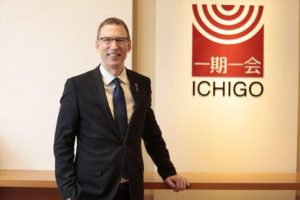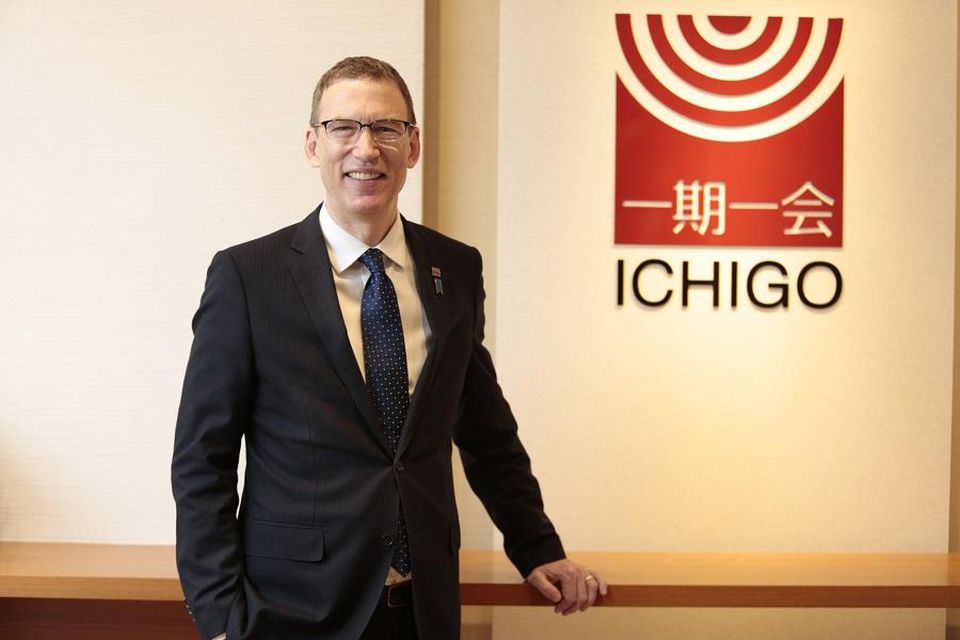You’ve probably heard of foreign businesspeople who have had great success in Japan, such as Carlos Ghosn, the former chairman of Nissan Motor. Bu

Scott Callon, CEO of Ichigo Asset Management Ltd., stands by his company’s logo. The name Ichigo
You’ve probably heard of foreign businesspeople who have had great success in Japan, such as Carlos Ghosn, the former chairman of Nissan Motor. But you might not know about an American investor who has played a key role in advising the Japanese government on reforming the corporate sector.
In July 2014, Scott Callon, CEO of Ichigo Asset Management, received a call from Japan’s Financial Services Agency (FSA) and was summoned for a meeting. Callon was filled with anxiety. After all, the FSA has jurisdiction over his company. His mind began racing: what could Ichigo have possibly done wrong? But when he met two very friendly FSA officials, his concern quickly turned to relief: the FSA just wanted his input on improving Japan’s corporate governance.
Founded in 2006, Ichigo Asset Management is an independent investment management company specializing in Japanese equities. It manages roughly $7 billion invested primarily on behalf of US and European endowments and charities. Ichigo takes a value-oriented approach, buying significant positions in companies with long track records of success such as Fujitsu, Japan’s largest IT services company, Aoyama Trading, the world’s largest suit retailer, and Chiyoda, Japan’s largest shoe retailer. Callon believes in using the products that Ichigo invests in, and isn’t shy about removing one of his shoes – made by Chiyoda, of course – and showing its quality workmanship to visitors. He also believes that investing for the long term gives Ichigo an advantage, because Ichigo accumulates detailed knowledge and understanding of its investee companies. At the same time, he has a strong focus on corporate governance at these companies.
Critics have long pointed out problems with Japanese corporate governance. In fact, Japan has faced an urgent need to enhance shareholder value. Following two decades of weakness after the collapse of the asset-inflated bubble economy, investors have been pressing for higher earnings and productivity at Japanese corporations. To that end, changes in corporate governance, including measures such as appointing more outside directors to carry out unbiased oversight of corporate activities, have been essential.
Callon was a member of the Ito Review, a government panel chaired by Professor Kunio Ito of Hitotsubashi University that in 2014 called for Japanese companies to generate a minimum 8 percent ROE (return on equity). Following his 2014 meeting with the FSA, Callon became the only non-Japanese to serve on a government committee that drafted Japan’s Corporate Governance Code, which was enacted in 2015. He also was on the government committee that revised and strengthened Japan’s Stewardship Code in 2017. These two Codes have transformed corporate culture and shareholder rights in Japan. In addition, Callon serves as a board member of the Japan Corporate Governance Network and helps judge the Tokyo Stock Exchange’s annual Corporate Value Improvement Award, which recognizes Japan’s top companies for shareholder value creation.
“When the Corporate Governance Code came into force on June 1, 2015, it was an extraordinary example of dramatic change that happened quickly,” says Callon. “It’s a strong code, consistent with best practice globally, and has overwhelming compliance. It’s been very successful in establishing a constitutional framework for companies and a bill of rights for shareholders.”
These changes to Japan’s business culture are part of Prime Minister Shinzo Abe’s program of economic reforms aimed at raising productivity and driving innovation. Amid this overhaul, the average ROE at Japanese companies has been increasing and is projected to surpass 10 percent in fiscal year 2018. That would bring Japanese firms in line with global businesses in their capital efficiency. In addition, the number of listed companies in Japan with two or more independent outside directors has risen from 17 percent to 88 percent, and by the end of March 2017 cross-shareholdings between companies had decreased to 9.9 percent of total Japanese shares.
In addition to its strong focus on corporate governance, Ichigo stands out among its peers in Japan’s financial sector for several reasons. For one, it’s led by an American who has played a key role in Japanese corporate reforms. Second, it operates according to a deeply Japanese philosophy: “Ichigo” comes from the 16th-century tea ceremony master Sen no Rikyu’s philosophy of service expressed as ichigo ichie, meaning “one lifetime, one encounter.”
“ichigo ichie is about caring for the other person, being fully in the moment and fully focused in order to serve your guest,” says Callon. “Investing in companies is different from investing in, say, copper or real estate or currencies, because companies are fundamentally human, filled with hard-working people. We believe companies exist to serve society. So, we have a triple mission to serve our investee companies, serve our clients, and serve Japan.”
Callon has a profound knowledge of Japan’s culture and economy from living most of his life in Japan; he has also raised four children there. He believes that the government’s reform programs make Japan a great place for foreign businesses to invest. One factor he cites is Japan’s abundant human capital, with high levels of education and highly motivated personnel. While the labor force has begun to shrink due to a low birthrate, Callon notes that birthrates are falling throughout the industrialized world and Japan is acting as a critical proving ground for other developed countries that face issues of aging. He points out that Abenomics reforms have also had significant success in raising female and senior labor force participation, thus dampening the effects of the low birthrate.
“Companies coming here obviously have to compete for talent – and there’s tons of talent here – but you also find there are few social barriers to labor-saving technologies,” says Callon. “Japan has a highly educated workforce that is highly capable of reskilling itself. So in that context, the ability to apply artificial intelligence (AI) and robotic technologies in an unfettered way, if it’s the best way to drive productivity, is something that’s very available in Japan.”
Other benefits to setting up business in Japan include access to a huge market in the world’s third-largest economy, government measures to lower the corporate tax rate from 37 percent to 29.74 percent, and resurgent economic growth supported by accommodative fiscal and monetary policies.
“Japan has significant wealth and a massive economy,” says Callon. “As such, global businesses that are not in Japan are missing an opportunity. Come to Japan, look hard at what’s available here. You’ll find a very sophisticated and loyal labor force, which will help keep your employee turnover low, and tenacious and sophisticated consumers, which will drive you to have a better quality product because you can’t win without it. For a global business, Japan is a very interesting and important place to be.”
forbes.com

